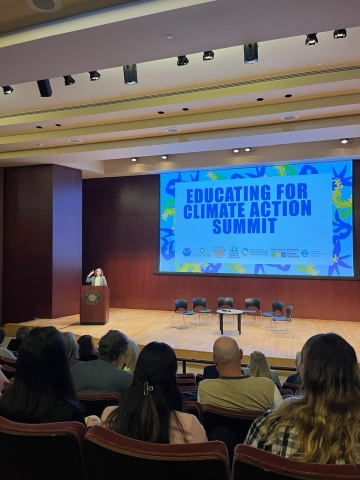
Sara Kennel, climate action intern, represented the Maryknoll Office for Global Concerns at Climate Week NYC 2024 from September 22-29.
The following article was published in the November-December 2024 issue of NewsNotes.
Climate Group, an international non-profit focused on driving climate action, organized the annual event—Climate Week NYC—again this year, on September 22-29. Climate Group and the United Nations coordinate the event in New York City to take place at the same time as the UN General Assembly, allowing heads of state and other senior government officials to participate.
The theme for Climate Week NYC 2024 was “It’s Time,” underscoring the dire need for climate action. Community activists, business leaders, political figures, organizations, Indigenous peoples, and local communities participated in over 900 activities in New York City to address the urgency of this moment.
Climate Group charts a path for a course correction on climate change with a “Global To-Do” list composed of seven ambitious actions: supporting workers to power down coal, unleashing renewables, banning the relining of coal-based steel furnaces, getting serious about methane, buying clean energy, paying attention to energy efficiency, and taxing fossil fuels to fund the transition to renewable energy.
While the to-dos are necessary to tackle climate change, they often lack actionable plans. Furthermore, the voices of Indigenous people and local communities are absent from this list.
Indigenous people and local communities are among the most impacted by the effects of climate change. Climate Week NYC included numerous events organized by Indigenous groups and allies that highlighted the role of Indigenous wisdom in addressing pressing issues. While the ambitious Global To-Do List outlined changes in infrastructure, the speakers from various Indigenous groups spoke of a change in framework. To address climate change, they said, we need to view our relationship with nature in a fundamentally different way and acknowledge our resource exploitation.
In the panel discussion “Wellbeing Through Climate Adaptation,” Walter Rodriguez Meyer, a professor at Stanford University, spoke on how our relationship with nature is restored in Indigenous thought. By Indigenous wisdom, we are inseparable from nature, he said, and so nature must be inseparable from the world we hope to construct. It is not us against Mother Earth, it is a coalition of care.
In the “Educating for Climate Action Summit,” the keynote speaker Tecumseh Caesar highlighted the importance of employing sustainable strategies while viewing animals as relatives. We cannot decide alone how to rebalance an ecosystem and protect its life; we must know how its animals live and the responsibilities they hold. Otherwise, we will only ever discover new ways to dominate an earth made for coexistence. The remarks echo what Pope Francis wrote in his encyclical letter, Laudato Si’, describing the bond between humans and God’s creatures as “Brother Sun, Sister Moon, Brother River, and Mother Earth.” referencing the Canticle of Saint Francis for which Laudato Si’ was named.
The Jean Charles Choctaw Nation in Louisiana sent representatives from their tribe, Chief Démé Naquin and Tribal Executive Secretary Chantel Comardelle, to speak about their experience with climate displacement. Sitting in a Columbia University classroom, they wove their story for a captive audience. Their tribe lived on the Isle de Jean Charles, their land of refuge after the Indian Removal Act of 1830. The island, initially a source of protection for their people, progressively eroded beneath them, carrying with it their cultural heritage and tradition. Rising sea levels and severe storms have contributed to large portions of the land disappearing.
Before the federal government awarded the state nearly $50 million in 2016 to resettle the tribe to higher ground, the children struggled to get to school as the connecting road, surrounded by water, often flooded. Chantel said, “It breaks my heart to watch something that has always been a staple in our lives, slowly decay without being able to do anything about it…we still have lots of culture and identity there.”
The community has suffered and continues to suffer injustices. A levy system that was built to mitigate storm damage did not take the island into consideration, leaving it defenseless. Once relocated, their community was fractured and lacked funding to build new homes. In all of this, they emphasized the lack of awareness of affected communities and stressed the importance of their voice. Chantel said, “This is an issue much larger than us. It’s about everyone having their basic human rights…marginalized communities are on the frontlines of the worst climate conditions, and if we support others in crisis, they can support us when we need it.”
When climate-affected communities tell their stories, they teach us climate resilience. Climate Week provided a space for the sharing of wisdom and stories we need to face the present moment as well as the future. Compassion begins here, standing in solidarity for the health of our common home.
Photo of Climate Week NYC 2024 by Sara Kennel.
